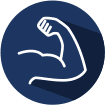With early detection, a child with Duchenne’s Muscular Dystrophy (DMD), can get treatment to slow the progress of the disease. This means that your child or young person may stay mobile longer and live more independently and longer than they would without specialized care and management.
Parents and caregivers can


Slowing disease progression

Controlling symptoms

Maintaining independence
and quality of life

Prescription drugs that help slow the loss of muscle function and treat the symptoms of DMD.

Treatments like physiotherapy, heart monitoring and breathing support that help patients function and feel better by avoiding complications from DMD.
Taking medicine can help protect the muscles and ease symptoms of DMD, even though they cannot cure the disease.

Corticosteroids the most-prescribed DMD treatment. Both the American Academy of Neurology (AAN) and the U.S. Centers for Disease Control and Prevention (CDC) guidelines recommend a special kind of steroid (called corticosteroid) for the treatment of DMD. By relieving inflammation, steroids can help stop damage and maintain muscle strength for as long as possible. And steroids can help people with DMD even after their muscles become too weak to let them walk. Corticosteroids may keep the upper limbs, heart, and lungs strong for longer, as well as reduce the chance of developing scoliosis. Your child’s treatment team can tell you more about how steroids can help slow the progress of DMD, and whether they may be appropriate for your child. To explore a DMD treatment option, please click here.

By targeting the dystrophin gene, disease modifying drugs allow the body to make a version of the muscle- protecting protein which is missing in DMD. While the protein the medicine helps make can’t cure DMD, it can slow down the progression of the disease.
Disease-modifying drugs are suitable for a relatively small number of people with DMD since they only target some of the mutations that cause DMD. The only way to know for sure whether a person with DMD could benefit from a disease-modifying drug is with genetic testing.

Exon skipping is a way to help the body make a form of dystrophin—the protein that people with DMD do not make naturally. By “teaching” the body to make a short version of dystrophin, the point of exon-skipping is to help the body make dystrophin again.
This kind of therapy is only available to people with a certain kind of genetic mutation, which has to be confirmed with a test.
DMD weakens muscles in the entire body, so it can have very wide-ranging effects. This makes people with the disorder more susceptible to a host of complications.
The best way to manage DMD is to try a combination of treatments and a team of specialist doctors, nurses, and other healthcare professionals.
Because DMD causes the muscles in the body to become weak and damaged, maintaining muscle strength and function is a key part of care.
Physiotherapists, occupational therapists and other rehabilitation specialists play a major role in the care of people with DMD. They work with patients to stretch out their muscles and keep their joints as flexible as possible.
As DMD progresses, a scooter, stroller or wheelchair may be needed to help your child get around and be more independent.
Because DMD affects the muscles that help control eating, swallowing and digestion, people with DMD often experience constipation and gastroesophageal reflux, as well as difficulty in chewing and swallowing.
A healthy diet, and maintaining a healthy weight, are especially important for people with DMD. A dietitian can help make sure that your child gets a well-balanced diet and the right amount of nutrients, supplements, and fluids. A gastroenterologist—a doctor who specialized in the digestive system—will also be able to help with any digestive problems.
People with DMD often develop a condition called osteoporosis. This makes the bones fragile and more likely to break. As back muscles become weaker, the spine may also begin to curve – a condition called scoliosis.
Radiographs or X-rays are used to detect bone weakness (early detection is better), and medication may be used to treat osteoporosis. Your doctor might suggest surgery or casting c in the case of broken bones (fractures) or scoliosis.
DMD also affects the muscles used for breathing. As the disease progresses, these muscles get weaker and people with DMD can develop a cough and/or have trouble breathing.
Breathing problems can be reduced by various machines that help the lungs to breathe (ventilators) and cough (cough assist machines). Your doctor will be able to suggest which machines you should consider, and when they might be most useful.
The heart is a muscle, and DMD can affect it, too. So your doctor will want to check your child’s heart often—and consult with a heart specialist (known as a cardiologist).
The cardiologist may suggest using medication if your child has a condition called cardiomyopathy—heart muscle damage. If your child’s heart muscle is relatively healthy, doctors might prescribe medicine to help reduce future damage.
Problems with learning, speech and behavior are more common in people with DMD. No one really knows why. (Although the DMD protein, dystrophin, has been found in the brain and scientists think they might be connected to learning, speech, and behavior issues in DMD).
Mental health professionals will be able to provide support, depending on your child’s individual needs. Schools will also be able to adapt to both physical and learning needs.
Receiving a DMD diagnosis is difficult, but you are not alone. There is an extensive care team available to DMD patients, and they will be able to offer information and support as you need it, so please reach out to them.
Your DMD care team may include the following:
Trained to navigate the healthcare system, these advisors provide social, psychological, emotional, and practical support for patients and families with DMD. They also provide guidance on services, equipment, and funding.
Mental health specialists who help families adjust to a DMD diagnosi, putting them in touch with services they might need and working with schools to make sure they have the right equipment and systems in place.
Trained in medical genetics, the genetic counselor can explain the various genetic tests available, their results, and help you make decisions about your own health based on what genetic testing reveals.
Highly trained in how food impacts health, a dietician provides nutritional therapy and/or advice to patients and their families.
A doctor who specializes in conditions that affect the brain, spinal cord, and nerves. This doctor is often in charge of the patient—directing and coordinating care for a person with DMD.
Specially trained in how muscles and bones connect with each other and work together, the physical therapist works with patients to improve muscle and joint function.
Specially trained in how muscles and bones connect with each other and work together, the physical therapist works with patients to improve muscle and joint function.
A doctor who specializes in bone and joint disorders.
A doctor who specializes in diseases of the heart and blood vessels.
A doctor who specializes in diseases of the lungs
A nurse who specializes in providing care for patients with DMD.
Adapted from Birnkrant et al. 2018,1 Birnkrant et al. 20182 and Muscular Dystrophy UK3
Birnkrant DJ, et al. Lancet Neurol. 2018;17:251–267 [Part 1].
Birnkrant DJ, et al. Lancet Neurol. 2018;17:347–361 [Part 2].
Bushby K, et al. Lancet Neurol. 2010;9:77–93. Gloss D, et al.
Neurology. 2016;86:465–472.
Mah JK. Neuropsychiatr Dis Treat. 2016;12:1795–1807.
Muscular Dystrophy Association. What is… Duchenne muscular dystrophy. Available at https://www.mda.org/sites/default/files/2020/10/MDA_DMD_Fact_Sheet_Oct_2020.pdf [last accessed March 2021].
Birnkrant DJ, et al. Lancet Neurol. 2018;17:251–267 [Part 1].
Birnkrant DJ, et al. Lancet Neurol. 2018;17:347–361 [Part 2].
Bushby K, et al. Lancet Neurol. 2010;9:77–93. Mah JK.
Neuropsychiatr Dis Treat. 2016;12:1795–1807.
Birnkrant DJ, et al. Lancet Neurol. 2018;17:251–267 [Part 1].
Birnkrant DJ, et al. Lancet Neurol. 2018;17:347–361 [Part 2].
Bushby K, et al. Lancet Neurol. 2010;9:77–93.
Birnkrant DJ, et al. Lancet Neurol. 2018;17:251–267 [Part 1].
Birnkrant DJ, et al. Lancet Neurol. 2018;17:347–361 [Part 2].
Birnkrant DJ, et al. Lancet Neurol. 2018;17:445–455 [Part 3].
Muscular Dystrophy UK. Care advisors and clinical nurse specialists. Available at http://www.musculardystrophyuk.org/get-the-right-care-and-support/people-and-places-to-help-you/professionals-and-organisations/care-advisors/ [last accessed March 2021].
Birnkrant DJ, et al. Lancet Neurol. 2018;17:251–267 [Part 1].
Birnkrant DJ, et al. Lancet Neurol. 2018;17:347–361 [Part 2].
Bushby K, et al. Lancet Neurol. 2010;9:77–93. Gloss D, et al.
Neurology. 2016;86:465–472.
Mah JK. Neuropsychiatr Dis Treat. 2016;12:1795–1807.
Muscular Dystrophy Association. What is… Duchenne muscular dystrophy. Available at https://www.mda.org/sites/default/files/2020/10/MDA_DMD_Fact_Sheet_Oct_2020.pdf [last accessed March 2021].
Birnkrant DJ, et al. Lancet Neurol. 2018;17:251–267 [Part 1].
Birnkrant DJ, et al. Lancet Neurol. 2018;17:347–361 [Part 2].
Bushby K, et al. Lancet Neurol. 2010;9:77–93. Mah JK.
Neuropsychiatr Dis Treat. 2016;12:1795–1807.
Birnkrant DJ, et al. Lancet Neurol. 2018;17:251–267 [Part 1].
Birnkrant DJ, et al. Lancet Neurol. 2018;17:347–361 [Part 2].
Bushby K, et al. Lancet Neurol. 2010;9:77–93.
Birnkrant DJ, et al. Lancet Neurol. 2018;17:251–267 [Part 1].
Birnkrant DJ, et al. Lancet Neurol. 2018;17:347–361 [Part 2].
Birnkrant DJ, et al. Lancet Neurol. 2018;17:445–455 [Part 3].
Muscular Dystrophy UK. Care advisors and clinical nurse specialists. Available at http://www.musculardystrophyuk.org/get-the-right-care-and-support/people-and-places-to-help-you/professionals-and-organisations/care-advisors/ [last accessed March 2021].
You are about to view a website that PTC Therapeutics has not reviewed for accuracy, relevance or completeness.
PTC Therapeutics does not endorse organizations that sponsor linked external websites, products, or services that such organizations may offer; and does not control or guarantee the currency, accuracy, relevance or completeness of the information found on the linked external sites.
All trademarks includes herein are the property of their respective owners.
Sign up to receive the latest information from the Duchenne muscular dystrophy community. Be the first to receive:
News alerts
Content updates
Latest resources
Ongoing support

This site is intended for US residents only.
The information on this site is not intended to make a diagnosis or to take the place of talking to a US health care professional.
PTC Cares™ is a trademark of PTC Therapeutics.
© 2022 PTC Therapeutics, Inc. All rights reserved.
Date of preparation: September 2022
MAT-CORP-0268
Neuromuscular disorders affect the muscles and nerves, and most of the causes are genetic. This means they are either passed down through the family or caused by changes in an individual person’s genes.
Most neuromuscular disorders cause muscle weakness that worsens over time. Signs and symptoms of neuromuscular diseases can vary and may be mild, moderate, or severe.
Most often, when a child has a neuromuscular disease, they don’t grow and develop as fast as other children their age. They are often slow to start lifting their head, sitting, walking, and talking.
Treatment and supportive care may improve the symptoms of a neuromuscular disorder, increasing mobility and even life expectancy.
Muscular dystrophy is the term for a group of neuromuscular disorders that cause muscle weakness and muscle loss.
Duchenne muscular dystrophy (DMD) is a type of muscular dystrophy that causes muscle weakness that worsens over time. The progression and symptoms can vary from person to person.